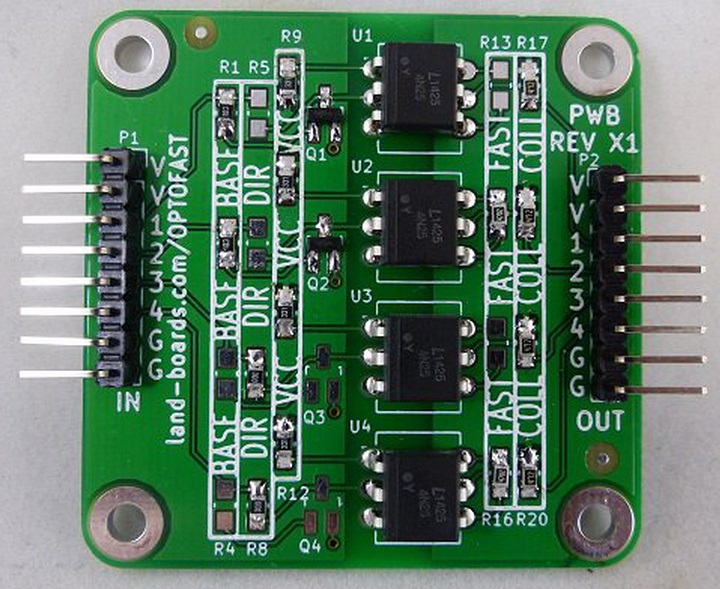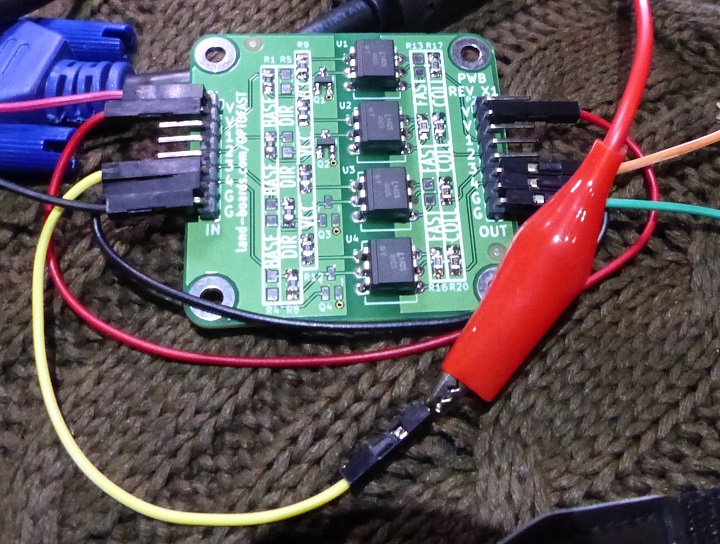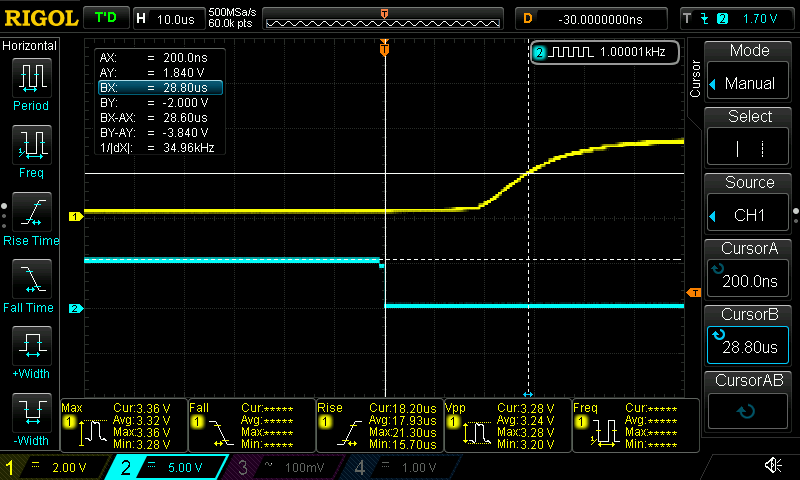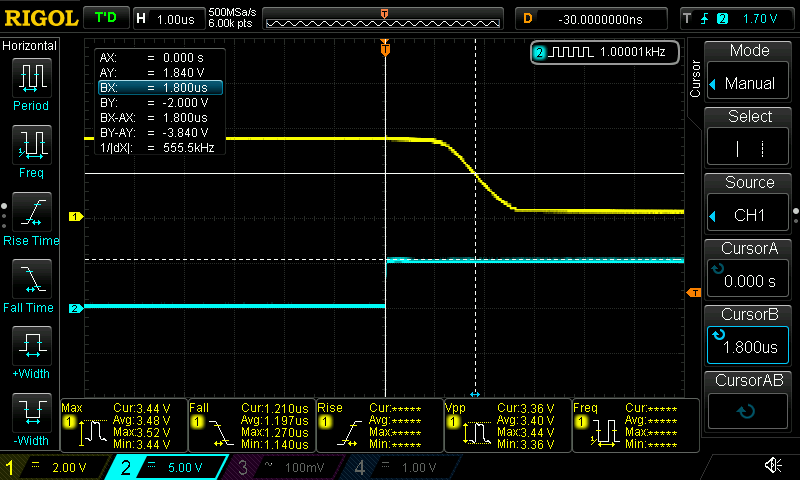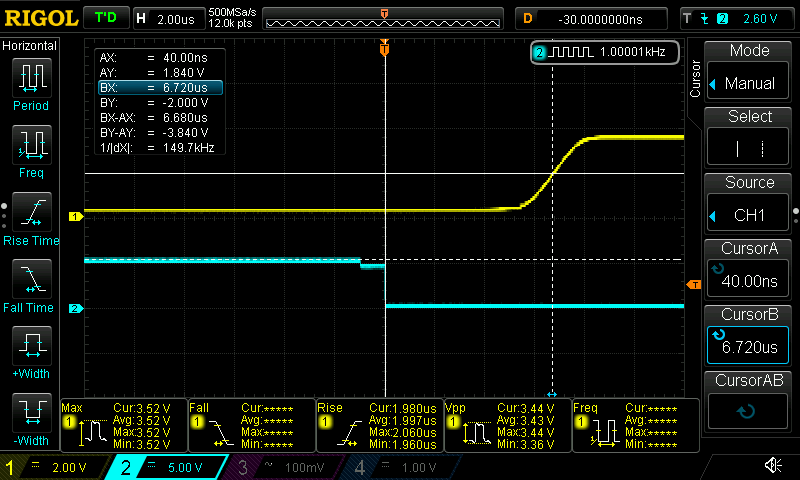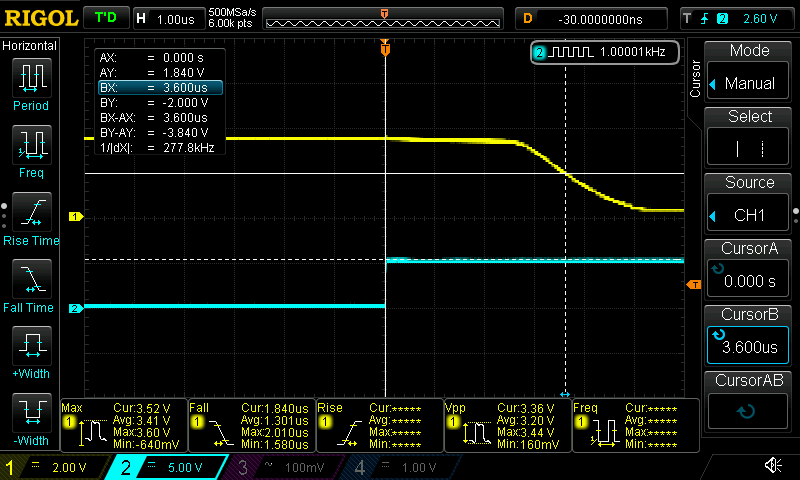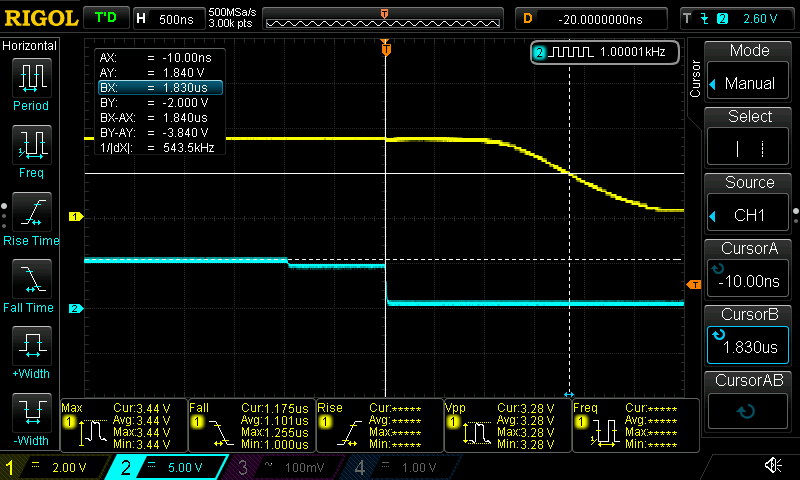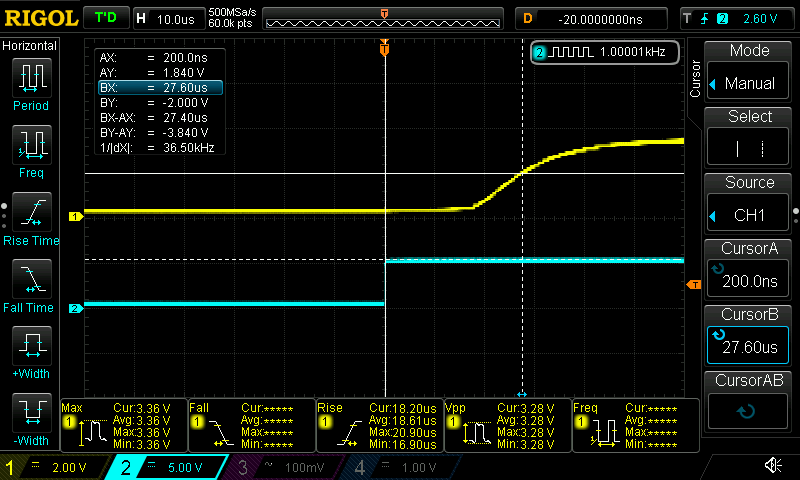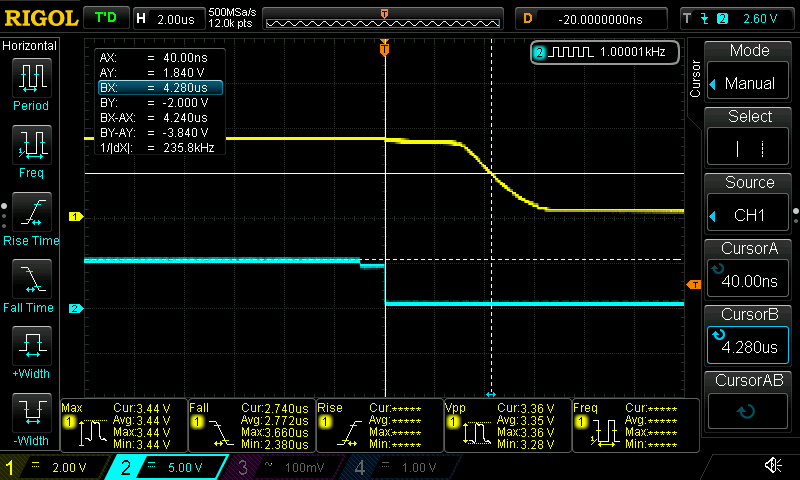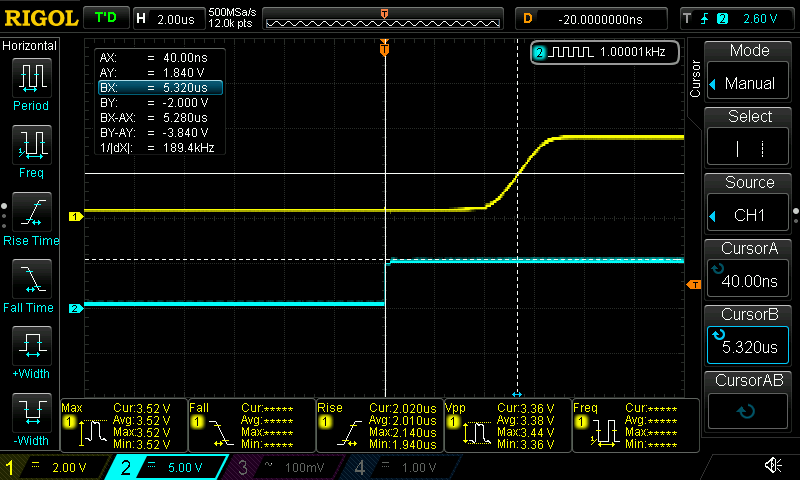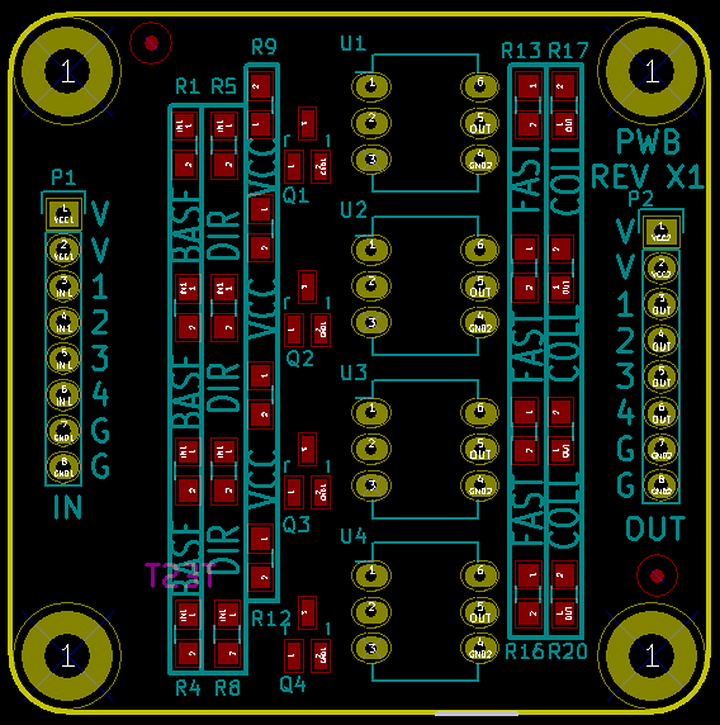Difference between revisions of "OPTOFAST"
Jump to navigation
Jump to search
Blwikiadmin (talk | contribs) |
Blwikiadmin (talk | contribs) |
||
| Line 84: | Line 84: | ||
| 4.11 | | 4.11 | ||
| 4.00 | | 4.00 | ||
| − | |||
| − | |||
| − | |||
| − | |||
| − | |||
| − | |||
| − | |||
| − | |||
| − | |||
| − | |||
| − | |||
| − | |||
| − | |||
| − | |||
| − | |||
| − | |||
| − | |||
| − | |||
| − | |||
| − | |||
| − | |||
| − | |||
| − | |||
| − | |||
| − | |||
| mA | | mA | ||
|- | |- | ||
Latest revision as of 20:55, 29 March 2023
Contents
OPTOFAST - 4 Channel Optocoupler Card
See our other Optocoupler cards
- OPTOFAST-2 - Speed improved 4 channel optocoupler card - Suggested replacement for this card
- OPTOSMALL - Four channel optocoupler card
- OPTOOUT8-I2C - Eight channel optocoupler card - I2C interface
- OPTOUSB - Optically coupled USB to FTDI interface
- OPTOFASTBI - Two Optos in Two Directions
Features
- Opto-Isolator card
- 4-Channels
- 4N25 Optoisolators
- Input /Output isolation
- Transistor driver for Opto LED reduces required drive from 10 mA to under 500 uA
- Input channels share their own common VCC/Ground
- Output channels share their own common Vcc/Ground
- 8-pin header for input
- 8-pin header for output
- Configuration Options (Speed enhanced, Bypass Input transistors, Remove Output collector resistors)
- 49x49mm
- (4) 4-40 mounting holes
Schematic (One channel)
- U1 represents U1-U4 (channels 1-4)
- Q1 represents Q1-Q4 (channels 1-4)
- R1 (VCC) represents R1,R4,R7,R10 (channels 1-4)
- R2 (DIR) represents R2,R5,R8,R11 (channels 1-4)
- R3 (BASE) represents R3,R6,R8,R12 (channels 1-4)
- R13 (FAST) represents R13-R16 (channels 1-4)
- R17 (COLL) represents R17-R20 (channels 1-4)
Input Options
- Refer to schematic for impact of options
Use Input Transistor - Standard Option
- Common VCC in option
- Install transistor Q1
- H1 do not short
| VCC(In) | 5.00 | 3.30 | V |
|---|---|---|---|
| R1 | 180.00 | 100.00 | Ohms |
| Vf LED | 1.30 | 1.30 | V |
| V LED | 3.70 | 2.00 | V |
| Icc | 20.56 | 20.00 | mA |
| CTR | 0.20 | 0.20 | A/A |
| Iout | 4.11 | 4.00 | mA |
Direct Drive - Special Option
- Do not install Q1
- Do not install R1
- R2 = 150
- Input current = LED current = 3.5V/150 Ohms = 23 mA
- Do not install R3
- Do not install Q1
- Short H1
Output Options
Standard Output
- R17 = 2.2K
- 5V/2.2K = 2mA of output transistor B-E current
- Leaves 4-2 mA = 2 mA of output low current
| VCC(In) | 5.00 | 3.30 | V |
|---|---|---|---|
| Iout | 4.11 | 4.00 | mA |
| VCC (Out) | 5.00 | 3.30 | V |
| R17 (COLL) | 2200.00 | 2200.00 | Ohms |
| I COL | 2.27 | 1.50 | mA |
| Iol | 1.84 | 2.50 | mA |
| Ioh | 2.27 | 1.50 | mA |
Open Collector Output - Special Option
- Do not install R17
Fast Option - Standard
- R13 = 20K (empirically determined from the scope eye)
Connectors
P1 - Input
8-pin, right angle, 0.1" pitch
- Vcc (In)
- Vcc (In)
- IN 1
- IN 2
- IN 3
- IN 4
- GND (In)
- GND (In)
P2 - Output
8-pin, right angle, 0.1" pitch
- Vcc (Out)
- Vcc (Out)
- OUT 1
- OUT 2
- OUT 3
- OUT 4
- GND (Out)
- GND (Out)
Test Card Measurements
Setup
- Goal was to determine the performance of the OPTOFAST card
- 5V operation
- Same 5V input/output power supply
- Each of the channels were configured uniquely/individually
- MHS-5200A - Digital DDS Dual-channel Signal Generator
- 1 KHz square wave
- 5V signal level
- Single channel checked at a time
- Oscilloscope
- Rigol DS1054Z
- 50 MHz
- Ultra Sigma software used for screen captures
Notes
- Note that the input buffer transistor inverts the signal
- Built a card that has four different configurations
- Options
- Fast/Slow
- Direct drive input LED/Transistor Buffered input
Test Results
| Channel | Fast/Slow | TransBuff/Direct | Input Rise/Fall | Time(uS) |
|---|---|---|---|---|
| 1 | Slow | Transistor Buffer | Fall | 28.6 |
| 1 | Slow | Transistor Buffer | Rise | 1.8 |
| 2 | Fast | Transistor Buffer | Fall | 6.68 |
| 2 | Fast | Transistor Buffer | Rise | 3.6 |
| 3 | Slow | Direct Input | Fall | 1.84 |
| 3 | Slow | Direct Input | Rise | 27.4 |
| 4 | Fast | Direct Input | Fall | 4.24 |
| 4 | Fast | Direct Input | Rise | 5.28 |
Ch1-Slow-NPNBuffer-InFall
- 28.6uS
Ch1-Slow-NPNBuffer-InRise
- 1.8uS
Ch2-Fast-NPNBuffer-InFall
- 6.68uS
Ch2-Fast-NPNBuffer-InRise
- 3.6uS
Ch3-Slow-Direct-InFall
- 1.84uS
Ch3-Slow-Direct-InRise
- 27.4uS
Ch4-Fast-Direct-InFall
- 4.24uS
Ch4-Fast-Direct-InRise
- 5.28uS

